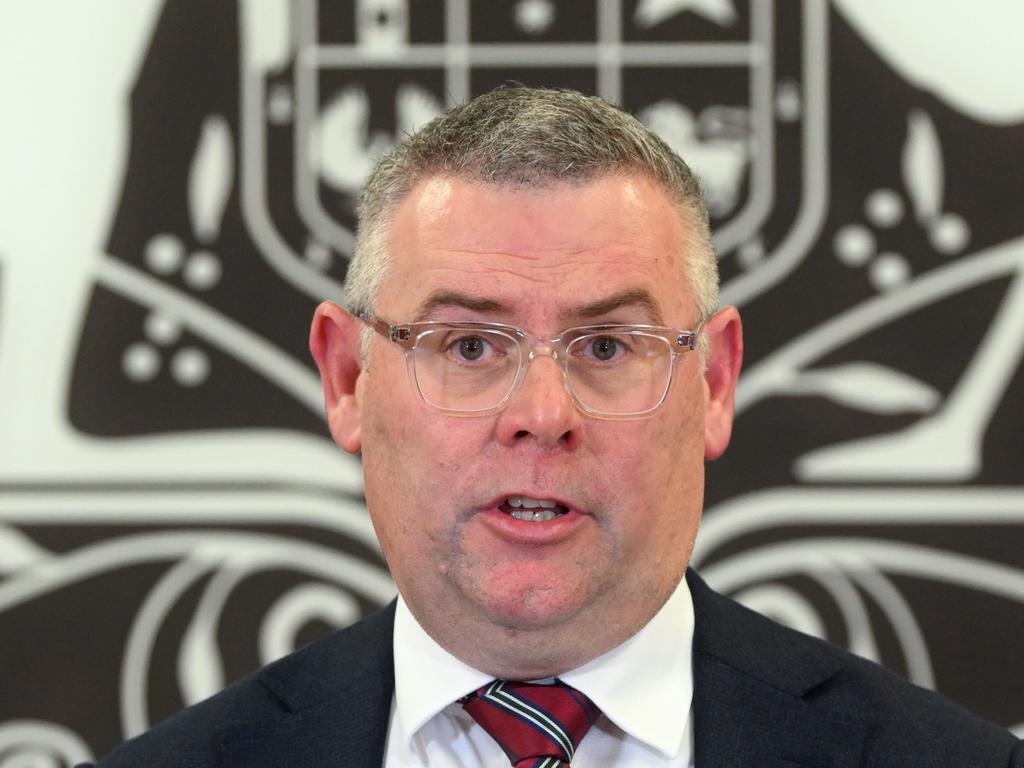NDIS needs a reboot to support people with disability, prevent fraud: Bill Shorten
Bill Shorten will intensify the crackdown on unethical practices to ensure all NDIS funding is spent on participants and not finding its way into the pockets of criminals.

Bill Shorten is flagging a “reboot” of the $34bn-a-year National Disability Insurance Scheme, saying it has “lost its way” and isn’t delivering the results nearly 600,000 people with disability who rely on the scheme deserve.
In an address to the National Press Club on Tuesday, the NDIS Minister says he will intensify the crackdown on fraud and unethical practices to ensure all taxpayer funding is being spent on participants and not finding its way into the pockets of criminals.
And “shoddy therapies that offer little to no value to participants or desperate parents”, will be weeded out of the NDIS, Mr Shorten says.
“The hard truth is the NDIS is not what it should be,” Mr Shorten will say.
“The NDIS lost its way. It is not delivering the outcomes Australians with disability need and the Australian public expects. To enable the NDIS to reach its potential, we need to – in essence – reboot.”
The minister says a review of the design, operations and sustainability of the NDIS is in train and due to report in October, but he will not wait to act to address its issues.
The NDIS was introduced in 2013 to support Australians with permanent and significant disability. There are currently 585,000 participants, with numbers projected to rise to more than a million by 2032.
The scheme was budgeted to cost $34bn this financial year, but actual costs are running higher. It is projected to cost $52bn by 2025-26, dwarfing the cost of both Medicare and aged care, rising to almost $90bn in a decade.
Treasurer Jim Chalmers has flagged the rising costs of the NDIS as one of the key challenges of next month’s federal budget. While it is a joint state-federally funded program and started with a 50-50 split, the agreement between the states and the federal government sees the commonwealth paying an increasing proportion of the cost over time. Currently the federal government is paying 66 per cent.
Mr Shorten has previously said moderating cost growth in the scheme was one of his key priorities. Part of the answer is putting a stop to criminal activity, rorting and overcharging, he has said, but another reason for the escalating cost growth is the unanticipated number of people entering the scheme beyond those for whom it was originally intended, particularly children with autism.
Mr Shorten notes that, since coming to the portfolio, he has instigated a fraud taskforce to pursue criminal syndicates exploiting the scheme.
And he has substantially reduced the time NDIS participants are left waiting in hospitals before being able to be moved into appropriate accommodation. In Victoria’s case, the fall is from 160 days to 29 days, saving the hospital system about $550m a year. “Currently, the taskforce has 38 investigations under way, involving more than $300m in payments,” Mr Shorten says.
“Last month alone, the taskforce received more than 1700 tip-offs about people trying to rip off the NDIS. It is sickening that criminal syndicates are stealing from people with disability.”
The minister acknowledges that the scheme has fundamental flaws, problems NDIS participants themselves have flagged.
“The system is too rigid,” Mr Shorten says. “It throws up Kafkaesque barriers to access, lacks empathy, gouges on prices, is too complex, and often traumatising to deal with.
“As a consequence, people with disability often feel they are caught between some predatory providers on one hand and an impersonal government agency on the other. That must change.”
Mr Shorten noted the “spiralling numbers” of children with developmental delays in a speech to The Australian-Melbourne Institute Outlook conference in November, saying the states, in particular their education systems, should be doing more to support this cohort outside the scheme.
“The NDIS was never intended to be the only lifeboat in the ocean,” he said.
The latest quarterly report to state and federal disability ministers reports that more than 92,000, or 16 per cent of all NDIS participants are children younger than seven. “Of the 20,477 new participants with an approved plan this quarter, 9813 were children younger than seven (48 per cent).
The Australian last month reported autism experts saying young children were being diagnosed with more severe autism than their characteristics warranted to give them a greater chance of securing a place on the NDIS, putting further pressure on the scheme’s financial sustainability.
In his press club address, Mr Shorten says unethical practices in the scheme go beyond criminal syndicates, and he would bolster resources in the National Disability Insurance Agency to ensure greater compliance. “It’s also about – through a renewed focus on evidence and data – getting rid of shoddy therapies that offer little to no value to participants or desperate parents.”
The government has previously rejected NDIS claims for crystal hearing and tarot card therapy.
Mr Shorten says he is concerned NDIS participants are seeing their money spent by service providers on support they don’t need, or paying unnecessary fees for services that aren’t on their plan.
“There are many great service providers from longstanding, not-for- profits to new family-run, small businesses,” Mr Shorten says. “But untrustworthy providers taint the reputations of quality service providers who work hard to support participants. Participants who have been preyed upon by these unscrupulous types have reported feeling ‘dehumanised’, exploited as ‘cash cows’.”
Despite the need for a reboot, Mr Shorten says the scheme, introduced a decade ago, is “here to stay”.
“The NDIS outlived the Rudd-Gillard-Abbott-Turnbull-Morrison governments,” he says. “(It is a) testament to the strength of the reform – and the strength of the community support.”








To join the conversation, please log in. Don't have an account? Register
Join the conversation, you are commenting as Logout